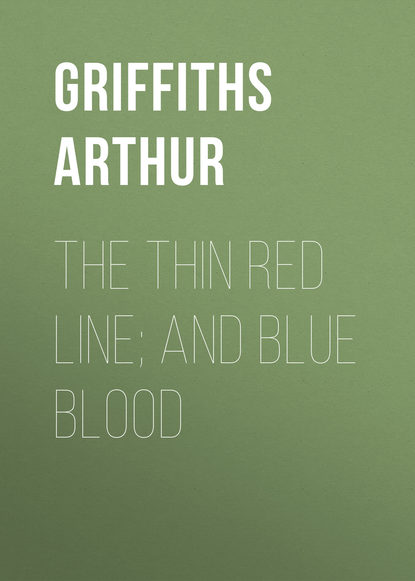По всем вопросам обращайтесь на: info@litportal.ru
(©) 2003-2024.
✖
The Thin Red Line; and Blue Blood
Настройки чтения
Размер шрифта
Высота строк
Поля
"You have been following me," said Mrs. Wilders, sharply, and jumping with all a woman's quickness at the right conclusion. "Who set you to spy on me?"
"I beg your pardon, madam; I am not a spy," said the young serjeant, formally saluting.
"Don't bandy words with me. Tell me, I insist!"
"The general was afraid something might happen to you. He thought you might need assistance—perhaps lose your way."
She looked at him very keenly as he said these last words, watching whether there was any covert satire in them.
But McKay's face betrayed nothing.
"How long have you been at my heels? How much have you seen?"
"I followed you from the Convent, madam, to this door. I have seen nothing since you went in here."
"I daresay you are wondering what brought me to such a place. A person in whom I take a great interest, an old woman, lives here. I knew her years ago. Psha! why should I condescend to explain? Look here, Mr. Sergeant"—she took out her purse and produced a sovereign—"take this, and drink my health!"
The sergeant flushed crimson, and drew himself up stiffly, as he said, with another formal salute, "Madam, you mistake!"
"Strange!" she exclaimed, scornfully. "I thought all soldiers liked drink. Well, keep the money; spend it as you like."
"I cannot take it, madam; I am paid by the Queen to do my duty."
"And you will not take a bribe to neglect it? Very fine, truly! General Wilders shall know how well you executed his commands. But there!—I have had enough of this; I wish to return to the yacht. Show me the shortest way back to the water side. Lead on; I will follow you."
Sergeant McKay took a short cut down the steep steps, and soon regained the Waterport. There Mrs. Wilders hailed a native boat, and, without condescending to notice the orderly further, she seated herself in the stern-sheets and was rowed off to the Arcadia.
CHAPTER VIII.
A SOUTHERN PEARL
"Mariquita! Ma—ri—kee—tah!"
A woman's voice, shrill and quavering, with an accent of anger that increased each time the summons was repeated.
"What's come of the young vixen?" went on the speaker, addressing her husband, the Tio Pedro, who sat with her behind the counter of a small tobacconist's shop—an ugly beldame, shrank and shrivelled, with grey elf-locks, sunk cheeks, and parchment complexion, looking ninety, yet little more than half that age. Women ripen early, are soon at their prime, and fade prematurely, under this quickening Southern sun.
The husband was older, yet better preserved, than his wife—a large, stout man, with a fierce face and black, baleful eyes. All cowered before him except La Zandunga, as they called his wife here in Bombardier Lane. He was at her mercy—a Spaniard resident on the Rock by permit granted to his wife—a native of Gibraltar, and liable to be expelled at any time unless she answered for him.
The shop and stock-in-trade were hers, not his, and she ruled him and the whole place.
"Mariquita!" she called again and again, till at length, overflowing with passion, she rushed from behind the counter into the premises at the back of the shop.
She entered a small but well-lighted room, communicating with a few square feet of garden. At the end was a low fence; beyond this the roadway intervening between the garden and the Line wall, or seaward fortifications.
La Zandunga looked hastily round the room. It contained half-a-dozen small low tables, drawn near the window and open door, and at these sat a posse of girls, busy with deft, nimble fingers, making cigarettes and cigars. These workpeople were under the immediate control of Mariquita, the mistress's niece. She was popular with them, evidently, for no one would answer when La Zandunga shrieked out an angry inquiry to each.
No answer was needed. There was Mariquita at the end of the garden, gossiping across the fence with young Sergeant McKay.
It was quite an accident, of course. The serjeant, returning to his quarters from Waterport, had seen Mariquita within, and made her a signal she could not mistake.
"I knew you would come out," he said, pleasantly, when she appeared, shy and shrinking, yet with a glad light in her eyes.
"Vaya! what conceit! I was seeking a flower in the garden," she answered demurely; but her low voice and heightened colour plainly showed that she was ready to come to him whenever he called—to follow him, indeed, all over the world.
She spoke in Spanish, with its high-flown epithets and exaggerated metaphor, a language in which Stanislas McKay, from his natural aptitude and this charming tutorship, had made excellent progress.
"My life, my jewel, my pearl!" he cried.
A pearl, indeed, incomparable and above price for all who could appreciate the charms and graces of bright blooming girlhood.
Mariquita Hidalgo was still in her teens—a woman full grown, but with the frank, innocent face of a child. A slender figure, tall, but well-rounded and beautifully poised, having the free, elastic movement of her Spanish ancestors, whose women are the best walkers in the world. She had, too, the olive complexion as clear and transparent as wax, the full crimson lips, the magnificent eyes, dark and lustrous, the indices of an ardent temperament capable of the deepest passion, the strongest love, or fiercest hate.
A very gracious figure indeed was this splendid specimen of a handsome race, as she stood there coyly talking to the man of her choice.
The contrast was strongly marked between them. She, with raven hair, dark skin, and soft brown eyes, was a perfect Southern brunette: quick, impatient, impulsive, easily moved. He, fresh-coloured, blue-eyed, with flaxen moustache, stalwart in frame, self-possessed, reserved, almost cold and impassive in demeanour, was as excellent a type of a native of the North.
"What brings you this way, Señor don Sargento, at this time of day?" said Mariquita. "Was it to see me? It was unwise, indiscreet; my aunt—"
"I have been on duty at Waterport," replied McKay, with a rather ungallant frankness that made Mariquita pout.
"It is plain I am only second in your thoughts. Duty—always duty. Why did not you come last night to the Alameda when the band played?"
"I could not, star of my soul! I was on guard."
"Did I not say so?—duty again! And to-morrow? It is Sunday; you promised to take me to Europa to see the great cave. Is that, too, impossible?"
McKay shook his head laughingly, and said—
"You must not be angry with me, Mariquita; our visit to Europa must be deferred; I am on duty every day. They have made me orderly—"
"I do not believe you," interrupted the girl, pettishly. "Go about your business! Do not trouble to come here again, Don Stanislas. Benito will take me where I want to go."
"I will break Benito's head whenever I catch him in your company," said the young serjeant, with so much energy that Mariquita was obliged to laugh. "Come, dearest, be more reasonable. It is not my fault, you know; I am never happy away from your side. But, remember, I am a soldier, and must obey the orders I receive."
"I was wrong to love a soldier," said Mariquita, growing sad and serious all at once. "Some day you will get orders to march—to India, Constantinople, Russia—where can any one say?—and I shall never see you more."
This trouble of parting near at hand had already arisen, and half-spoilt McKay's delight at the prospect of sailing for the East.
"Do you think I shall ever forget you? If I go, it will be to win promotion, fame—a better, higher, more honourable position for you to share."
It was at this moment that La Zandunga interrupted the lovers with her resonant, unpleasant voice.
"My aunt! my aunt! Run, Stanislas! do not let her see you, in Heaven's name!"
The Serjeant disappeared promptly, but the old virago caught a glimpse of his retreating figure.
"With whom were you gossiping there, good-for-nothing?" cried La Zandunga, fiercely. "I seemed to catch the colour of his coat. If I thought it was that son of Satan, the serjeant, who is ever philandering and following you about—Who was it, I say?"








